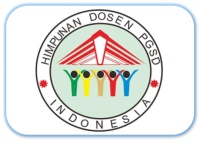Pengaruh Model Cooperative Learning Tipe Artikulasi Terhadap Hasil Belajar Siswa di Sekolah Dasar
Abstract
Keywords
Full Text:
PDFReferences
Agib, Z & Murtado, A. (2016). Kumpulan Metode Pembelajaran kreatif dan inovatif. Bandung: Sarana Tutorial Nurami Sejahtera
Desyandri. (2012). The Usage of Contextual Teaching and Learning (CTL) Approach to improve the process and learning outcome of Singing to the Student Class III Elementary School YPKK of Padang State University. Pedagogi: Jurnal Ilmu Pendidikan, 12(1), 36–52. Retrieved from http://pedagogi.ppj.unp.ac.id/index.php/pedagogi/article/view/231
Desyandri. (2018). Nilai-nilai Kearifan Lokal untuk Menumbuhkembangkan Literasi Budaya di Sekolah Dasar. Sekolah Dasar: Kajian Teori Dan Praktik Pendidikan, 27(1), 1–9. https://doi.org/http://dx.doi.org/10.17977/um009v27i12018p001
Friska, O. (2015). Analisis Kemampuan Siswa Kelas X Pada Ranah Kognitif, Afektif, dan Psikomotor. Jurnal Fisika dan Pendidikan Fisika. Vol 1. Nomor 2
Huda, M. (2017). Model – model Pengajaran dan Pembelajaran. Yogyakarta: Pustaka Belajar
Irianto, A. (2008). Statistik Konsep Dasar, Aplikasi, dan Pengembangannya. Jakarta: Prenamedia Group
Kurniawati, S., Eka, dkk. (2010). Penerapan Model Pembelajaran untuk Meningkatkan Proses dan Hasil Belajar Siswa Pada Mata Pelajaran IPS Materi Hidrosfer Kelas VII H SMP Negeri 3 kartasura. Jurnal Model Pembelajaran Artikulasi (JP UNS) vol.1 no. 1.Hlm:5-6
Kuwati, dkk. (2007). Model Pembelajaran TGT dalam Meningkatkan Pembelajaran PKn Siswa Kelas IV Sekolah Dasar. Jurnal Model dan Pendidikan, Volume 19 Nomor1.Halaman:1
Prasetyo, B & Jannah, Lina, M. (2011). Metode Penelitian Kuantitatif. Jakarta: Rajawali Press
Rukeishi & Cahyana. (2015). Metododologi Penelitian Pendidikan. Jakarta: PT. Grafindo Persada
Sugiyono. 2012. Metode Penelitian Pendidikan Pendekatan Kuantitatif, Kualitatif, RnD. Bandung: Alfabeta
Sukma, E. (2016). Kompetensi Kognitif Pembelajaran Apresiasi Sastra di Sekolah Dasar. Jurnal Pendidikan Bahasa dan Sastra Indonesia. Vol 2. Hlm 1 - 11
DOI: http://dx.doi.org/10.24036/e-jipsd.v6i2.5724


